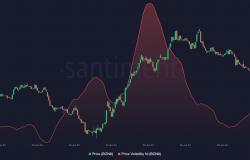President Gustavo Petro and Jonathan Malagón, president of Asobancaria, during the closing of the Banking Convention that took place in Cartagena.
Photo: EFE – Ricardo Maldonado Rozo
At the 2024 Banking Convention, the 58th edition of this event, key conversations took place about the present and future of the country in economic matters. This space is not limited to dialogues about the financial system: from the list of panelists it was clear that a diversity of actors would take the microphones to speak to the bankers. Not in vain, Roy Barreras, Colombian ambassador to the United Kingdom and former senator, said on Thursday during his speech that at the event there was “more quorum than in Congress.”
The speeches were full of invitations to work as a team; However, the applause and silence could not hide the tensions that persist between the government of President Gustavo Petro and the business sector. In any case, Asobancaria assured that it is not seeking to be a “spoke in the wheel”, but rather to build a team and Petro was conciliatory, even when it came to insisting on forced investments, a strategy that bankers have questioned.
Also read: “There was a mistake by the Government”: Petro referred to the collection situation
Is the road uphill?
The Medium-Term Fiscal Framework, which the Government must present in the coming days, will be a key document to know where the economy is going. As Alberto Carrasquilla, former Minister of Finance, said, the document will be the great input to answer the questions that remain on the table regarding whether the cash flow will be sufficient or not. “For now I would leave the tax issue on an ellipsis.”
The announcement by the Ministry of Finance that the budget will be cut by $20 billion, considering, among other things, the drop in collections, clarified the panorama a little. José Antonio Ocampo, professor at Columbia University and former Minister of Finance of the Petro government, told this newspaper that it is a “positive sign” that the Government will respect the fiscal rule.
Andrés Velasco, dean of the School of Public Policy at the London School of Economics and former Minister of Finance of Chile, maintained that the whole game is played in the fiscal field: “There are two types of countries, those that are fiscally ordered and those that are a mess, Colombia has not been as orderly as some, but it has been reasonably orderly. It is a tremendous risk that Colombia becomes on the side of the countries that lack fiscal discipline.”
Now, how much can this budget cut affect the economic recovery? The answer, says Ocampo, will depend on where there are cuts: “The sectors that have the most effects on employment, I would try to protect them,” he said. The Minister of Finance, Ricardo Bonilla, explained that the decision will be made in the coming days and was clear that the adjustment “cannot go to social expenses or the Government program.” On the inside this does not seem to be an easy decision.
Ricardo Bonilla, Minister of Finance, at the 2024 Banking Convention.
Photo: EFE – Ricardo Maldonado Rozo
You may be interested in: “Forced investments were an element of financial repression”: Asobancaria
Bonilla took the opportunity to confirm that the country is and will continue to comply with the payment of the debt, detailed the reasons that prompted the national administration to request an expansion of the debt quota and the motivations behind the upcoming increase in the price of diesel. For the long-awaited economic reactivation, a constant in all the talks at the event, the head of the portfolio called for unity, recognizing that recovery is everyone’s job.
The keys to reactivation
Several keys to reactivation were put on the table. One of the most popular words, in this and all events of this nature in the last year, is trust. César Pabón, director of economic research at Corficolombiana, points out that if legal certainty is not provided, if the environment of uncertainty does not improve, “an aggressive or rapid reactivation cannot be expected.” Part of that trust will be put into play with the Fiscal Framework.
There was also talk of public-private coordination to revive sectors such as infrastructure and housing that, clearly, are drivers of the economy and investment, another of the terms that were not missing in any of the panels. Mauricio Cárdenas, professor at Columbia University and former Minister of Finance, pointed out that the drop in investment, which depends largely on trust, is compromising future growth: “People are not investing because they are not clear about where the investments are going. things”.
At this moment, how is the reactivation going? It depends on who you ask. For some good, for others very bad. For Ocampo, although there are negative figures, there are also good signs. The former minister recognizes that the country is growing less, but asks to look at these data in context, considering that this Government received an economy that was “overheated to the max,” with a high fiscal deficit and public debt at historic highs, among other things. From his analysis, the economy had to adjust.
Also: After a year in the red: how would banks close in 2024?
Ocampo highlights that economic activity began to grow since the last quarter of 2023 and draws attention to exports, which grew, according to the latest DANE report. If this trend is confirmed, he assures, especially in non-traditional sectors (such as agriculture and manufacturing), “there will be a positive sign.” In any case, he maintains that a reactivation policy is needed.
Ocampo assured in his speech that “political polarization is a severe issue,” but that the economic country, at this moment, is going on one side, and the political one, on the other. In the conversation with this newspaper, however, he said that at the Banking Convention he showed concern among businessmen and that he hopes that this situation does not impact the economy: “The important thing from the Government’s point of view is to show signs of trust and respect.” of the institutionality.”
Interest rates
Lowering interest rates faster was one of the requests of the banking union. Luis Carlos Sarmiento, president of the board of directors of Grupo Aval, assured that the Issuer is “exaggerating” in keeping the real interest rate so high with the argument of a possible resurgence of inflation.
Petro joined the call: the president maintained that there is a “cornering” of the State and the private sector because capital is in trouble. “The way is for the Bank of the Republic to lower the interest rate. “We already have the worst financial system in Latin America.” And also Bonilla, who stated that the real rate is becoming an “obstacle” to economic recovery, because it makes financial closures of projects difficult.
Also read: Why has inflation been more persistent in Colombia? This is what Villar said
The Central Bank has been clear regarding these requests. In fact, Leonardo Villar, manager of the Bank of the Republic, said at the meeting that although analysts and personalities have advocated for a more accelerated decline, “caution has benefits” to prevent an early decline from driving inflation again, with everything that means for the economy.
Although inflation has been reduced by more than six percentage points in the last year, Villar recalled that it has done so more slowly than in other countries and that “2024 will be the fourth consecutive year in which we do not meet the goal.” But he also gave a piece of reassurance by confirming that “the worst and most painful of the adjustment process is now behind us.”
A solid financial system
The outlook for banks in 2023 was complex, to say the least. Jonathan Malagón, president of Asobancaria, described it as one of the “most difficult years in the history of this industry”, with the fourth worst portfolio record in 101 years of activity. “Eight banks recorded losses of around $2 billion. We had not had a similar figure so far this century, where a third of the financial system recorded numbers in the red.”
In any case, the actors in the financial system took advantage of the space to clarify that, despite the banks’ red numbers in 2023 and in the first quarter of 2024, there is no financial crisis in sight. In fact, Pabón highlights that, according to Corficolombiana’s analysis, for solvency to approach the minimum required limits, events would have to occur that reduce the technical equity to about half of its current value.
“Despite the losses, the solvency report remains high, well above the minimum we demand. There are two important topics to measure the financial system: the solvency ratio and the liquidity ratio; They are both very loose, that gives us peace of mind,” César Ferrari, financial superintendent, explained to this newspaper.
At this point, teamwork, which sounds easy, but in practice requires much more than declarations of good intentions, can facilitate (or complicate) the dreamed-of reactivation. The next point on the scoreboard will be defined by the Medium-Term Fiscal Framework, which is in the Government’s court.






